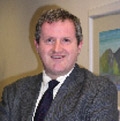Ian Blackford, IR manager at CSM, won an iPad after taking part in the first round of IR magazine’s global practice survey
Ian Blackford, investor relations manager at Dutch company CSM, is an exception to the rule. While most IROs are based in or close to financial centers, Blackford lives and works on the Isle of Skye, a small island off the coast of Scotland.
He also stands out for another reason. Blackford was the lucky respondent randomly picked to win an iPad for taking part in the first round of IR magazine’s global practice survey, which canvassed the views of more than 1,200 IR professionals. Below, he talks to IR Magazine. Are you keeping the iPad for yourself?
Are you keeping the iPad for yourself?
Yes, I will be.
Do you think it will be useful for your IR work?
I’ve actually been using it this week. And I have to say I have found it a very useful tool. Given that all of us spend so much time on the road, you’ve got constant demand to be in touch with people – people looking for information, sending emails and all the rest of it – and the iPad is a fantastic business tool because between meetings you can deal with all the other issues that are arriving over the course of the day.
Tell us about your job.
I’ve got overall responsibility for investor relations at CSM. It’s the full gamut of activities you would normally expect.
I have been a fund manager and I’ve also been a broker for 20-odd years in total – I was head of Dutch equities at Deutsche Bank – and when I left the business getting on for 10 years ago now, I set up an investor relations consultancy, specifically to help Dutch companies, because that’s where my background was.
It was mainly to do strategic work only. But what’s happened is that, in a couple of cases when companies have been in trouble, I’ve been asked to adopt a more hands-on approach.
When I joined CSM in 2005, for example, it was initially for a three-month period, but the company asked me to stay on beyond that. So it’s true to say I still have a consultancy role, but to all intents and purposes I operate in the same way as an employee of the company.
What’s it like working from a small island in Scotland?
It’s a strange situation. I’ve got an office in Amsterdam [where CSM is based], and I was over there earlier this week, but on a day-to-day basis I run the activities from my own office here on the Isle of Skye. I don’t think there’s another IRO in such a remote location. Maybe there is, but I’ve certainly never come across one.
Of course, the world has changed enormously over the course of the last 10 years. In a way, however, the desire for face-to-face meetings has not decreased over that time – if anything it’s probably increased, and there’s huge demand to travel to see investors, whether it’s for roadshows, conferences, company meetings or something else, so I probably spend two to three days a week on the road one way or the other.
Seeing as you’re in a consultancy role, are you doing any other work at the moment?
Because CSM has been so hands-on, I’m not really doing any other IR work for any other company. But as I’m not strictly speaking full time – even though, in many respects, I am – I do one or two other things as well.
I’ve got three non-executive directorships in Scotland and I do some leadership and management development with companies in Scotland as well, although I have scaled that back. I suppose it’s an unusual beat for an IR officer. It’s very much a mixed bag.
How do you think Europe’s debt problems and uncertainty in the market will affect IR in 2012?
To being with, it colors the kind of discussions you have in the company, discussions about where we are going over the short term and the medium term. I don’t think it’s just an issue for 2012; I strongly believe we’re in a situation that is here to stay for a considerable period of time.
That has an impact on how you run the business in terms of how you have to adjust your cost base, even to the extent of the activities you want to be involved in ‒ and, of course, on how you deliver growth.
And I think it does make the point that the delivery of organic growth and investment and innovation are so important, in order to differentiate yourself in the market.










